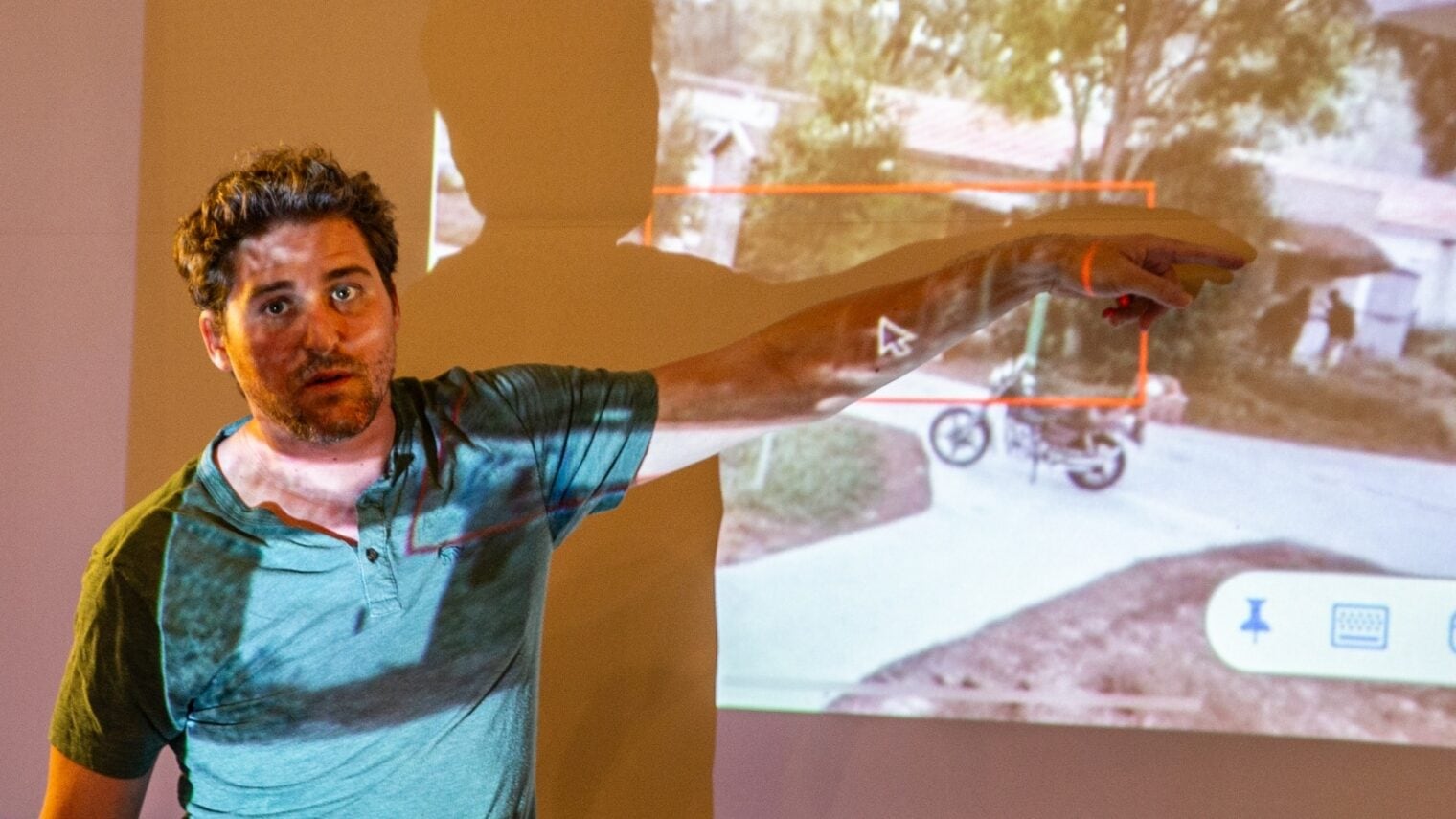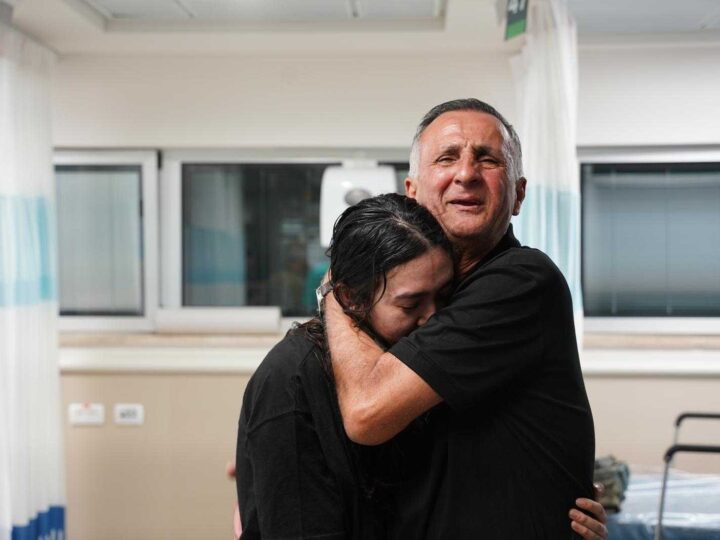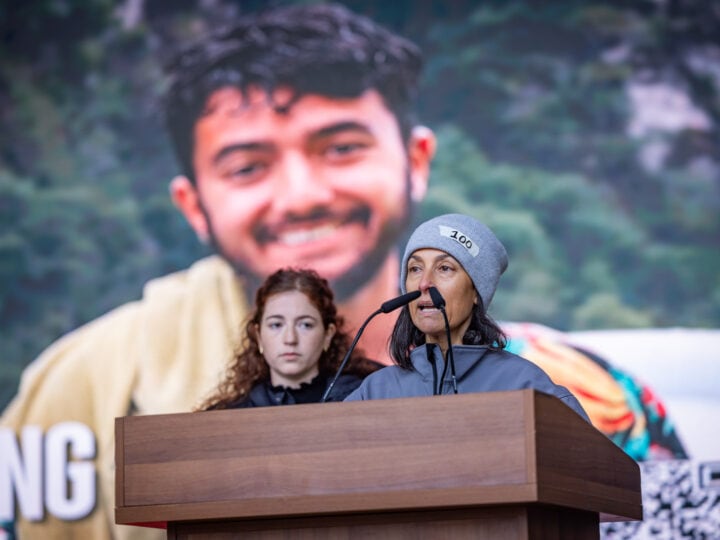First the terrorists set fire to all the cars at Kibbutz Nir Oz so that nobody could escape. Next they sabotaged the water supply, so they couldn’t put out the flames.
Then, accompanied by women and teenagers, they embarked on their cold, calculated killing and kidnapping spree at Kibbutz Nir Oz.
On the morning of Saturday, October 7, the kibbutz was home to 427 people. Within hours, 40 of them had been murdered and 79, including 16 children and a nine-month old baby, had been abducted to Gaza, just 2.3 kilometers (1.4 miles) away.
Here, four survivors tell their harrowing stories.
Renana Jacob, waiting for her sons to come home
Renana Jacob is haunted by the last words she heard from her two boys — Yagel, 12, and Or, 16 — over the phone as they were snatched from their house.
“You can’t take me, I’m too young!” Or told the terrorists.
“A 12-year-old was begging for his life, trying to get the international law in his favor,” said Renana, 56.
“This was the last I heard from him. My boys used to call me every two minutes. It used to drive me nuts, it was always at important meetings. And now all I’m wishing for is to have that phone call, to hear them again, nagging me.
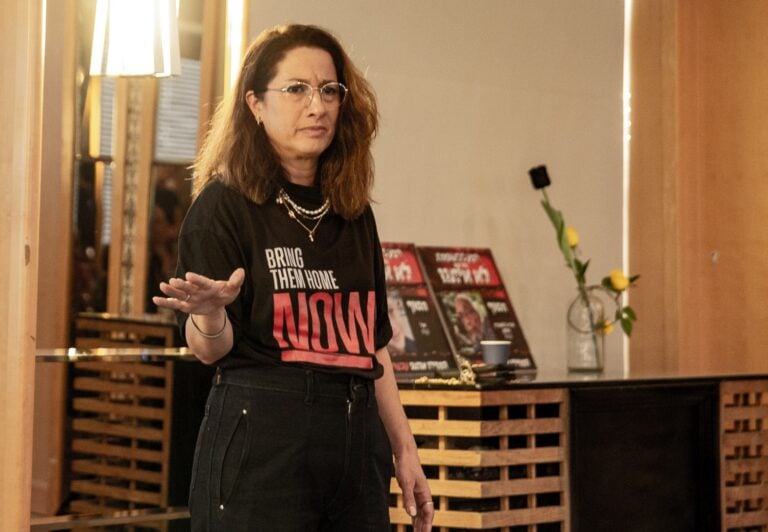
“Look at your phones and see the last time you had a call from your son or daughter and what were the last words you heard from them. These were the last words I heard them say and it was over a month ago.”
That final call came from the family’s reinforced “safe room,” designed to offer physical protection from missiles but not to keep out intruders.
Renana, who was at a nearby kibbutz at the time, heard voices speaking Arabic, heard the door being forced open, and then the line went dead.
“I think of them, alone in a pit or a dark tunnel, with no sense of time,” she says in an animated video produced to publicize their plight.
Yagil and Or Jacob are two boys who were abducted from Kibbutz Nir Oz by Hamas terrorists on Oct7. 30 Israeli children are held by Hamas. We will free them, and dismantle the organization that abducted 239 and killed over 1000 Israeli civilians. Animation by Yoni Goodman. pic.twitter.com/DVX5eN6Vha
— Jonathan Conricus (@jconricus) October 30, 2023
“I hope that they are together, keeping each other strong and that they are with other children who were also kidnapped.”
Earlier this month, terrorists from Palestinian Islamic Jihad, a group associated with Hamas, released a psychological warfare video of Yagel and another hostage.
“I know you’re all curious,” said Renana. “So I’m just going say it in one sentence because I’m not going to discuss it. Yes, it was Yagel on the video. I was very happy to see him alive and well.
“He was as sharp and intelligent as he always is. And I will not fall into the trap that Hamas and Jihad are trying to get me into, so you will not get any other reactions to this video.”
Renana, who managed a nearby kibbutz before the massacre, is desperately waiting for news of her two boys, but also keen to highlight the suffering of others.
She tells of a 12-year-old girl having a sleepover with her grandma. They were both murdered and the house was burned down.
And a mother of three who was abducted with her three children by terrorists on motorbikes after her husband was shot and badly wounded.
She and two daughters fell from the bike and escaped. She watched helplessly as her 12-year-old disappeared into the distance. Her husband is presumed to also have been kidnapped.
Irit Lahav, owes her life to an oar
Irit Lahav and her daughter Lotus, 22, owe their lives to the oar from a rowboat. They used it to barricade themselves inside the safe room after terrorists broke into their home.
“We used the oar from a rowboat I had as a child, and a vacuum cleaner,” said Irit. “We tied them together and tied them to the door handle.
“They tried to come into our safe room five times. The first time they tried for eight long minutes. We’re just holding hands and saying how much we love each other, saying goodbye words.
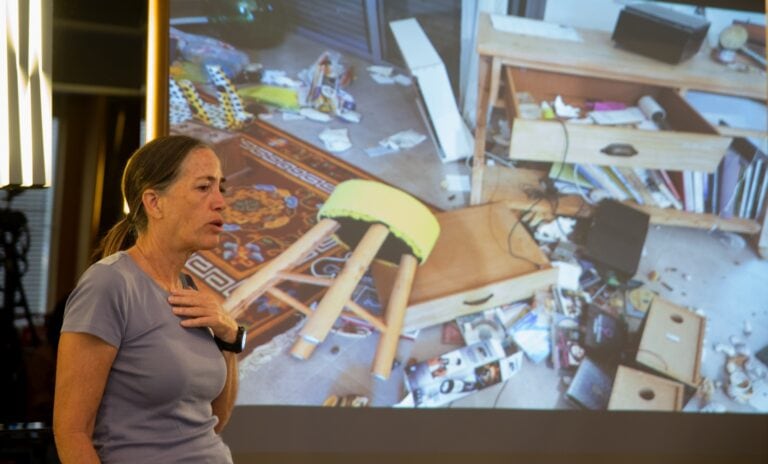
“We kept silent, we turned off the lights, we just wrote to each other. We had our cell phones luckily, and we had the dog. I was afraid that the dog may bark but it didn’t.”
Mother and daughter hid under a table, with books piled up in front of them, hoping that if the terrorists did storm the safe room, the books would provide some protection from their bullets.
They survived, physically unharmed, but it took 12 hours before IDF soldiers arrived.
“Nearly every family you meet has lost relatives, parents, brothers, sisters or best friends,” said Irit, who grew up living, eating, sleeping and working with other kibbutz children rather than in her parents’ home.
“When I hear that people have been murdered or kidnapped it’s like my family, because we grew up so closely together. They are like my brothers and sisters.
She said the shooting started at 6:35am. “There was constant [noise from] automatic weapons and grenades until 4pm, no silent moment, an unimaginable amount of artillery. Now we understand where all the money went to from the European Union to support the Gaza Strip.”
She displays pictures of what remains of the kibbutz. The terrorists cut the gas pipes to half the houses after plundering them. They then burned them, said Irit, to make sure there was nothing left.
“They took everything they could find – money, wallets, cell phones, TV, my daughter’s expensive cameras, jewelry, shoes, sandals, bicycles and motorbikes.”
They took her small stone Buddha, but left behind the bigger one, made of marble and weighing 46kg.
Irit describes herself as a peace loving pro-Palestinian person. “My mother used to tell me I was more Palestinian than the Palestinians themselves,” she said. Irit used to regularly drive Palestinians from Gaza to hospital appointments in Tel Aviv.
“I was sure that in 2005 when Israel moved out of the Gaza Strip, that they got what they want. They got their own land. Finally peace will come. And I was totally shocked. Two months later, missiles were landing on us.”
Natali Yohanan, the terrorists knew our house
Natali Yohanan is convinced the terrorists knew the precise layout of her home. Within seconds they’d found the electricity box – concealed behind a shower – and cut the power to the safe room where she and her family had taken refuge.
“It would have taken me a couple of minutes; they did it in 15 seconds,” said Natali, 37, an elementary school English teacher.
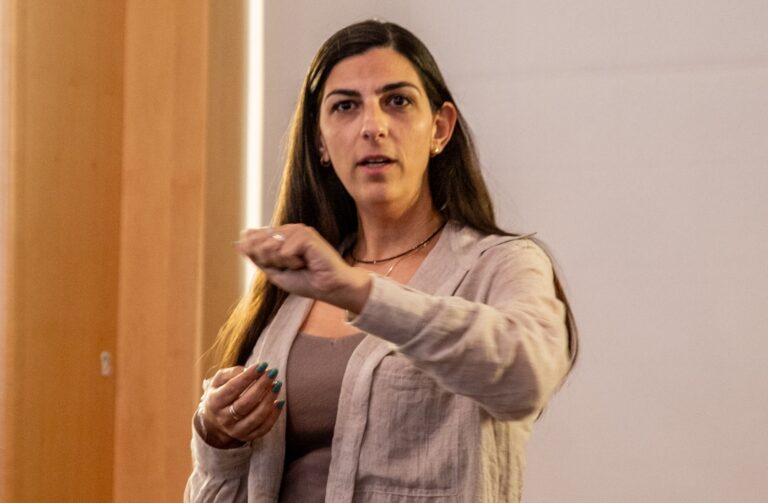
Her husband heard shooting and opened the front door. “There were four Hamas terrorists waiting for him. They knew our house and they were waiting for him,” said Natali.
Her husband had a gun, she said, but after 40 minutes he was screaming for her to open the door because he’d run out of ammunition. As she let him in, she felt a bullet just miss her arm.
They hid in their safe room, in the dark and the stifling heat, as the terrorists tried repeatedly to get in, banging on the door every half hour.
“My husband was holding the door for 12 hours straight because there was no lock. We don’t have locks on our doors or windows,” said Natali.
“My house is small, the corridor is so small the terrorist couldn’t hold the weapon and shoot the door. So he started kicking the door, but the corridor is so narrow he couldn’t kick the door.”
They heard him curse, then return to their living room, with another terrorist and a young woman, and settle down to watch Netflix in Arabic on their TV, which they later stole.
At one point they rolled what sounded like a grenade along the floor towards the safe room, hoping to trick them into coming out. They later discovered it was a pickle jar.
The intruders were calm and relaxed. It was a party for them, she said.
“The woman started singing, and she asked [the terrorists] ‘Are you hungry? Are you thirsty?’ and she went into my fridge.”
Natali could smell the soup and the toast from the safe room. She could hear the woman rifling through her clothes, makeup and jewelry in her bedroom.
“She even took dirty clothes from the laundry. It was so humiliating, I could hear her going through my closet. My eight-year-old son could hear them stealing boardgames from his room.”
The terrorists left after five hours. It was even scarier, said Natali, not knowing what to expect next.
“We sat like that for 12 hours in the dark, no water,” she said. “The kids were naked because it was so hot. We kept telling them the army is coming.”
When the IDF finally arrived, it took several minutes for Natali and her family to believe they were genuine, not a Hamas ruse.
Eyal Barad, saw events unfold via security camera
Eyal Barad took refuge in his safe room and watched helplessly via the camera outside his home as a neighbor was kidnapped by Hamas terrorists. The camera relayed pictures in real time to his phone.
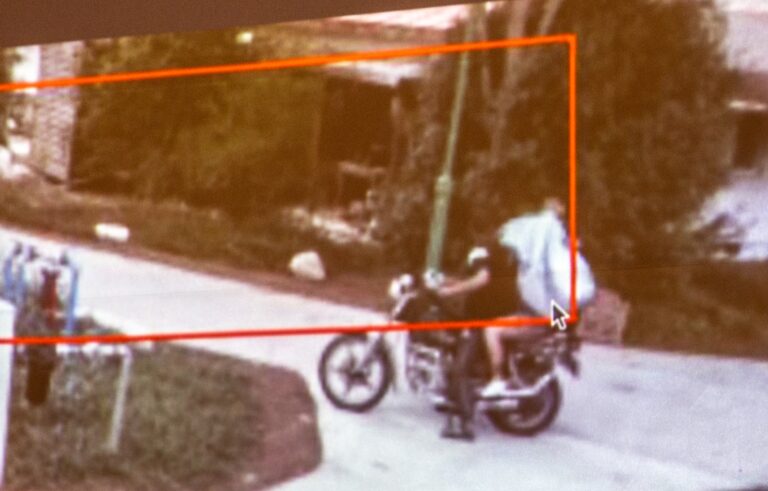
“I had no gun, I couldn’t do anything,” the 40-year-old engineer said. “All I could do was stay by the door and listen to what was going on outside. I knew if I opened the door and go out, I’m dead with my family.
“The kids wanted to go out and have fun, like every other Saturday. I had to tell them they can’t go, there are dead people outside. If we go out they will kill us.”
He saw a car arriving, and six or seven terrorists jump out. He has video of them riding around on his bike and his wife’s bike before stealing them. There is a young woman and a teenage boy in the footage.
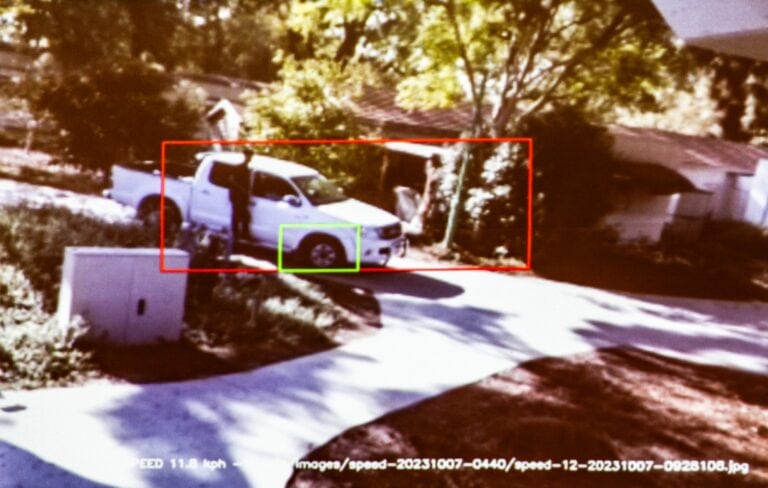
Eyal doesn’t understand how he, his wife and their three children– Rotem, aged 18 months, Almog, four and Carmel, six – managed to survive. The terrorists knocked on their door, he could see them approaching the house on his phone, but they didn’t force an entry.
“I was scared, not for myself but for my kids. I didn’t know what was going to happen. The fact that I’m here is a miracle. I have no explanation why I survived.”
Tragically, his wife’s father, also a kibbutz member, was shot and died four hours later in his wife’s arms. “If he’d had help he would have survived. He was 80, but he would have survived,” said Eyal.
Eyal was busy deleting updates from his mother-in-law, so his wife wouldn’t see the terrible news, as his breathing became shallower. She’d given her phone to the kids to play with.
“I was getting messages that houses are getting burned, people are getting shot,” said Eyal. “People posted messages on WhatsApp saying they’d been shot, their house was on fire,” he said.
“People were saying terrorists are in their house, please come and help. My older daughter is autistic and she thought this was a game, she did not understand the situation we were in.
“I asked her to be quiet, but most of the time she was shouting, she was thrashing around, she was making a lot of noise. I had to hold my hand over her mouth.
“We trusted the army and the government, but nobody came to help.”




